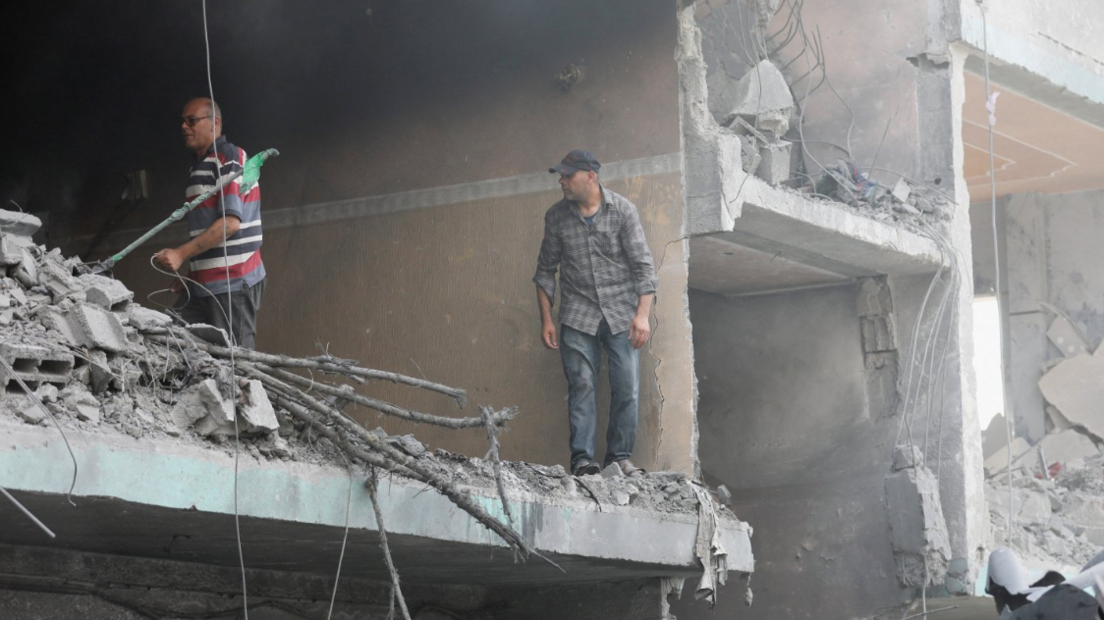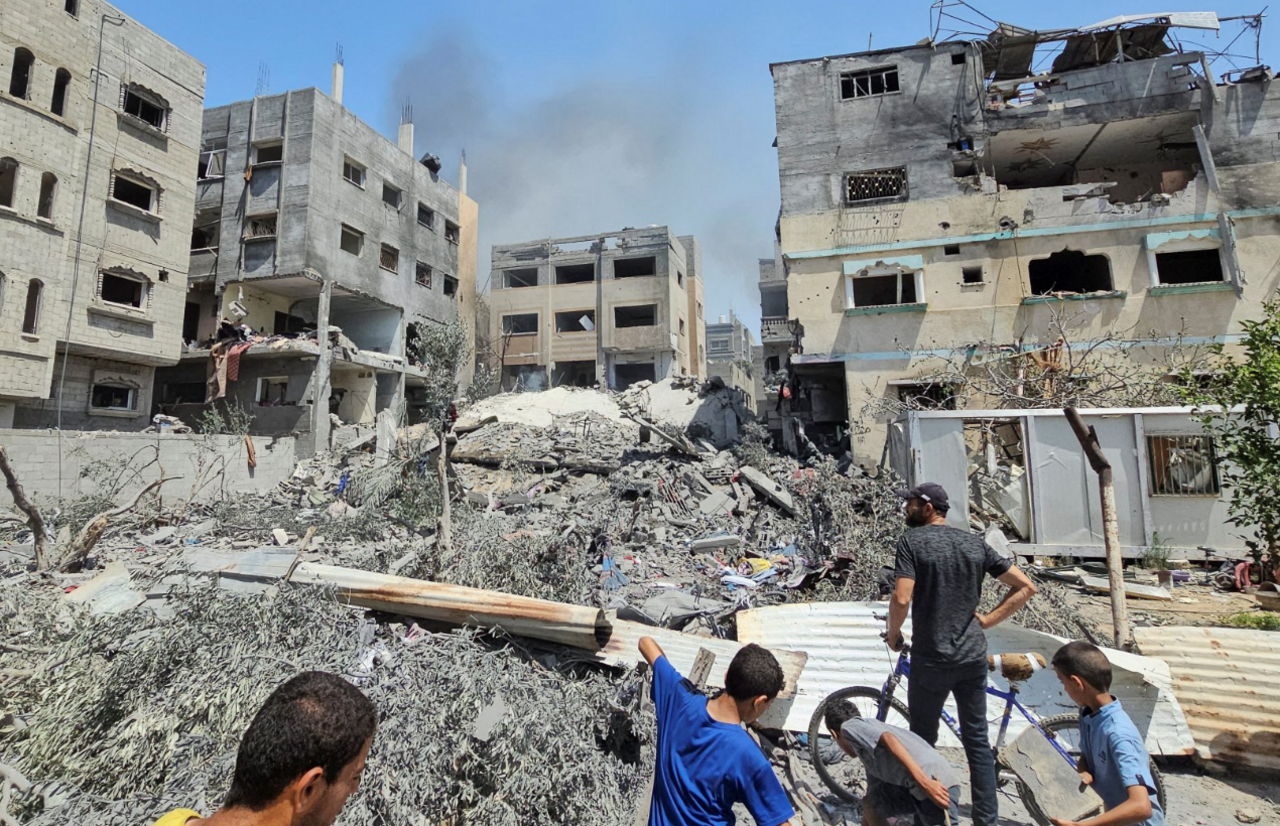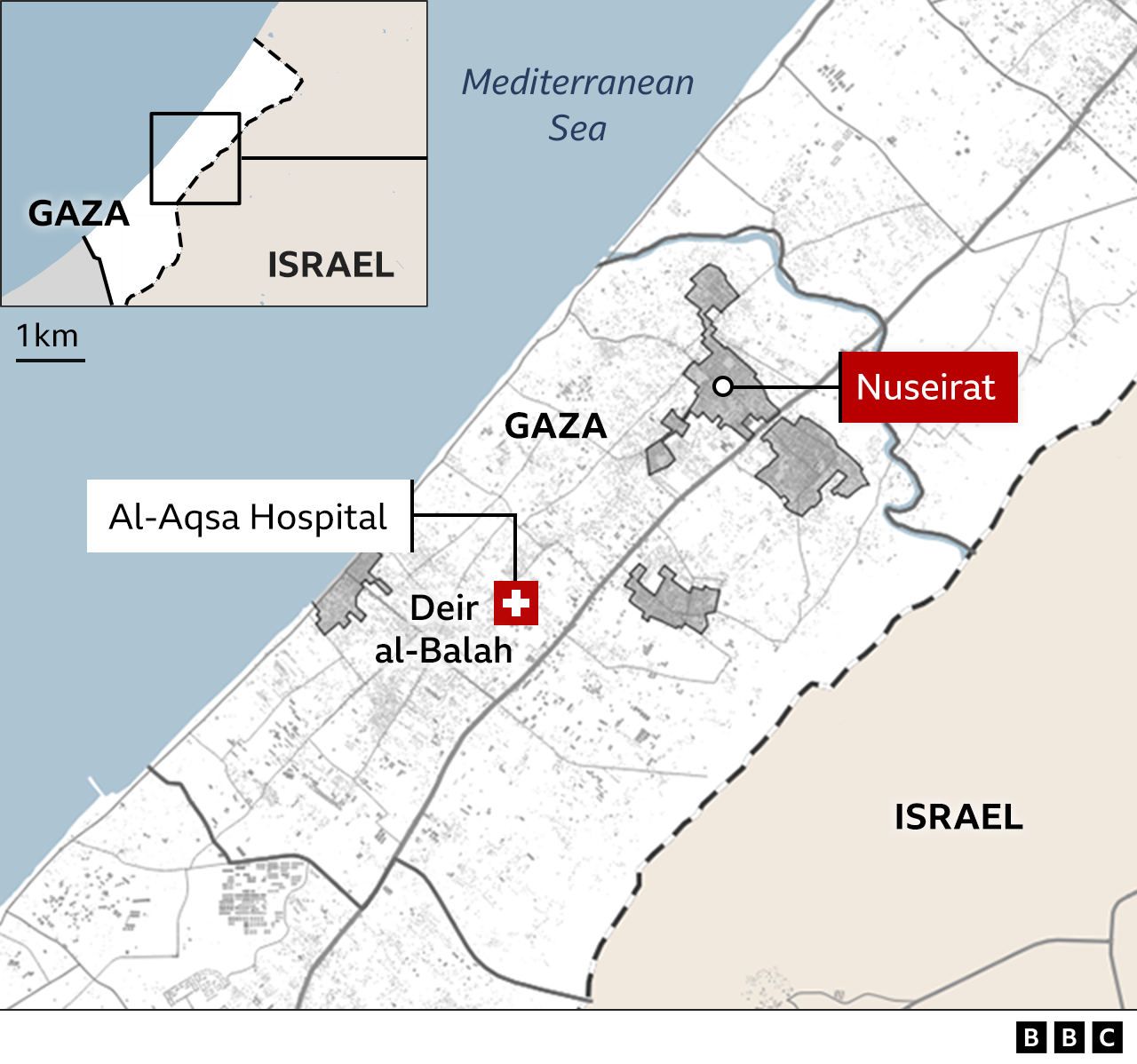Gaza health ministry says Israeli hostage rescue killed 274 Palestinians

There is increasing outrage at the number of Palestinian casualties in Saturday's operation in and around Nuseirat
- Published
The Hamas-run health ministry in Gaza says an Israeli raid on a refugee camp - which led to the rescue of four hostages - killed 274 people, including children and other civilians.
On Saturday Israel's forces, backed by air strikes, fought intense gun battles with Hamas in and around the Nuseirat refugee camp, freeing the captives.
Noa Argamani, 26, Almog Meir Jan, 22, Andrei Kozlov, 27, and Shlomi Ziv, 41, who were abducted from the Nova music festival on 7 October have been returned to Israel.
The Israeli military has estimated that fewer than 100 people died in the operation.
But the latest figures from the Hamas-run health ministry in Gaza would, if confirmed, make it one of the deadliest days of the conflict so far.
People living in the densely-populated area have described the terror of coming under intense bombardment and heavy gunfire.
One man, Abdel Salam Darwish, told the BBC he was in a market buying vegetables when he heard fighter jets from above and the sound of gunfire.
"Afterwards, people's bodies were in pieces, scattered in the streets, and blood stained the walls," he said.
The return of the hostages to their families has sparked celebration in Israel and world leaders, including US President Joe Biden, have welcomed the news of their release.
But there has been mounting criticism of the deadly cost of the operation inside Gaza, with European Union foreign affairs chief Josep Borrell saying he condemned it "in the strongest terms".
"Reports from Gaza of another massacre of civilians are appalling," he wrote on X.
An Israeli minister said that instead of condemning Hamas for hiding behind civilians, the EU had condemned Israel for saving its citizens.
How Israel's hostage rescue in Gaza unfolded
- Published9 June 2024
Watch as rescued Israeli hostages are reunited with families
- Published8 June 2024
Images from the Nuseirat refugee camp area show intense bombardment and people mourning the dead.
Two hospitals in Gaza, al-Aqsa hospital and al-Awda hospital, said they had counted 70 bodies between them.
The Hamas-run health ministry released names of 86 people out of the 274 Palestinians it says were killed during the two-hour operation.
Previously, Israel's military spokesman Daniel Hagari estimated there were fewer than 100 casualties in what was a "high-risk, complex mission" based on "precise intelligence".
Defence Minister Yoav Gallant said special forces operated "under heavy fire" when rescuing the hostages. One special forces officer was wounded and later died in hospital.

Victims are said to still be buried under the rubble of buildings following strikes on Saturday
Videos from Gaza taken in the aftermath of the raid show scenes of carnage.
Footage from the al-Aqsa hospital shows numerous people with severe injuries laying on the ground, leaving barely any space on the blood-stained floor for doctors to move between patients.
Other video shows a frequent stream of new cases being driven in by car and ambulance and carried into the building.
The director of the al-Awda Hospital in Nuseirat told BBC Arabic the number of dead coming to the hospital increased throughout Saturday.
Dr Marwan Abu Nasser also spoke about the lack of a morgue in the hospital to accommodate the bodies of those killed who had been taken to the hospital.
Grief in Gaza as scores killed in IDF hostage raid
One man, who said more than 40 members of his family have been killed since the conflict began in October, described to the BBC being in a house which was hit by a strike.
"As soon as these children and women entered the house, the bombing attack took place, claiming the lives of all those inside it," he said,
"This home, which used to house approximately 30 people who then became 50, was bombed... only me, my father, my wife, and a young man survived... we are the only survivors out of 50 people."
The bloodshed on the ground prompted a rare venting of criticism at Hamas from people in Gaza.
Hassan Omar, 37, said he lamented the unnecessary loss of lives in Israeli strikes, telling the BBC: "For each Israeli hostage they could have freed 80 Palestinian prisoners and without any bloodshed - [that] is a million times better than losing 100 dead.
"My message to Hamas is stopping the loss is part of the gain, we should get rid of those who control us from Qatar hotels.”
Stories of the hostages taken by Hamas from Israel
- Published27 February
Who are the released hostages?
- Published27 February
The rescue of hostages came amid efforts for a ceasefire and hostage release deal between Israel and Hamas.
Israeli Prime Minister Benjamin Netanyahu has been urged to reach an agreement but faces opposition from far-right allies who say military action is the only way to bring the hostages back.
Saturday’s operation is the most successful rescue of hostages by the Israeli military in this war – and analysts say it could change the calculation of a prime minister who is under increasing pressure.
In response to the military offensive in Nuseirat, Hamas political leader Ismail Haniyeh said Israel could not force its choices on the group.
He said the group would not agree to a ceasefire deal unless it achieved security for Palestinians.
During its 7 October attacks in southern Israel Hamas killed about 1,200 people and took some 251 people hostage.
Some 116 remain in the Palestinian territory, including 41 the army says are dead.
A deal agreed in November saw Hamas release 105 hostages in return for a week-long ceasefire and some 240 Palestinian prisoners in Israeli jails.
On Saturday, the Hamas-run health ministry said the death toll in Gaza is now 37,084 people.
